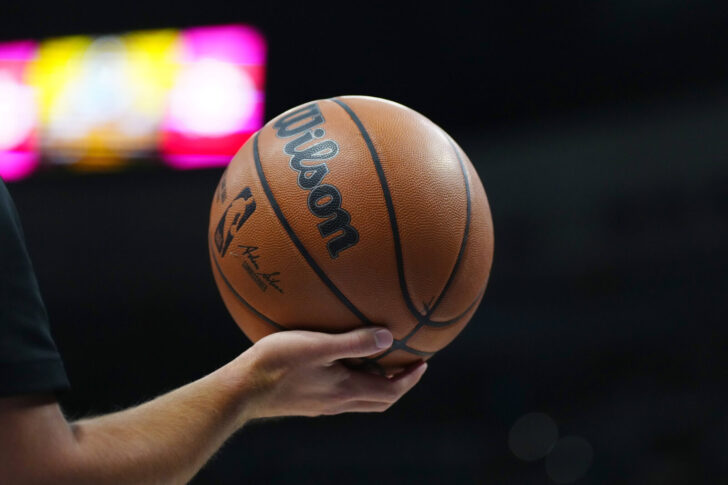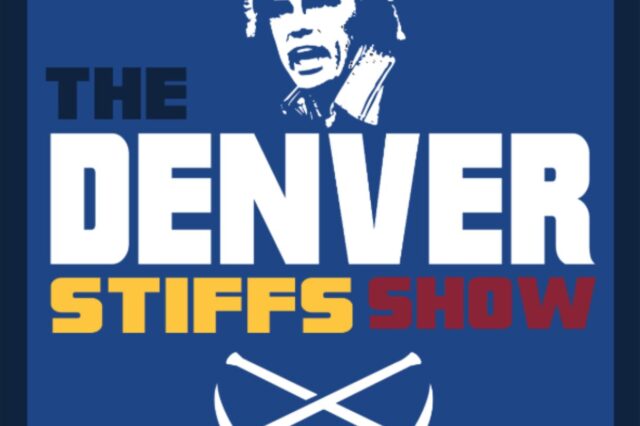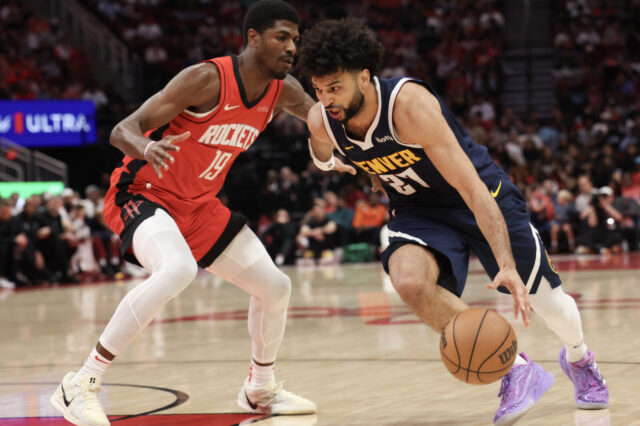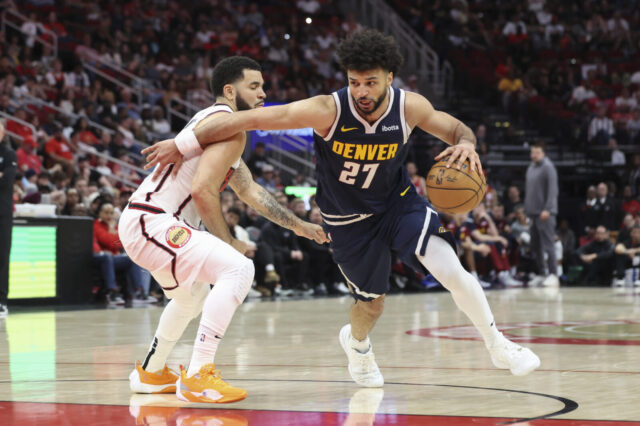Your Denver Nuggets play their very first NBA cup game tonight. In case you’re unaware, the NBA Cup is the new in-season tournament the NBA is rolling out in their ever ongoing quest for more money. Drawing inspiration from European soccer leagues, the NBA Cup does not actually have any tangible effect on who wins the championship, but is designed to bring excitement during the doldrums of the regular season. In order to not make it just a complete exhibition, all of the NBA Cup games, with the exception of the championship, count towards regular season standings. The championship is truly an exhibition, but comes with a cool half million dollar prize for each player on the winning team ($200k to the losers). Will it bring extra juice and attention to the league? Probably a little…I mean, here I am writing about it after all, but will it be on the level of the Premier League’s FA Cup or La Liga’s Copa del Ray? Probably not, or at least not at first. Those aforementioned tournaments have over a century of history behind them and actually earn the teams things other than money.
How the heck does the NBA cup work
Group Play
The NBA Cup is a tournament with round-robin group play for qualifying and a single elimination tournament at the end to determine the winner. There are a total of six groups, three per conference. The groups are determined by the win/loss record from the previous season and a random draw. So for example, the Nuggets, Memphis Grizzlies and Sacramento Kings finished one, two and three respectively in the Western Conference last season and are the top seeds in each Western Conference group for the NBA cup. The Phoenix Suns, Los Angeles Clippers and Golden State Warriors were the four, five and six teams in the standings last season and are the second seed in each group of the NBA cup and so on and so forth until each group has five total teams. The seeding in the groups doesn’t really matter. Each team plays every team in it’s group once with two games at home and two on the road. Whichever team wins it’s group will qualify for the knockout round and whichever second seed from the groups that had the best record in group play will be the fourth and final team from the conference to make the knockout round. Group play games are spread out over the course of November and are played on either Tuesdays or Fridays. You’ll be well aware that your team is playing a Cup game because they’ll be wearing their City Edition jerseys and playing on an NBA Cup themed court.
Knockout Round
Once group play is finished, scheduling gets a bit trickier. The elimination tournament happens over the course of the first week of December with the quarterfinals starting on December 4th and the championship played on December 9th. The quarterfinals are played with home court advantage for the top two seeds in each conference and the semifinals and finals are played at a neutral site in Las Vegas. During this week, the other twenty-two teams who did not qualify for the knockout round will play two regular season games against other eliminated teams. Similarly, the teams that are eliminated in the quarterfinals will play a regular season game against one another during the week. The championship game will not count as a regular season game and is for bragging rights, a trophy, cash and the honor of being the first ever NBA Cup champion.
How can we make NBA players and fans actually care
Listen, $500k is $500k and while NBA players make millions, who wouldn’t want a cool half mil for walking around money in Vegas? Additionally everything except the championship still counts towards the team’s regular season record so every team should be motivated as much as they would be in the regular season anyways. Still, you have to wonder when we get to the championship will you see teams elect to rest their stars in what amounts to a pointless game. No doubt this would make Adam Silver’s head turn a festive Rudolph red color but would you really blame any team for resting players in what is ultimately a pointless game happening in the first third of the season? I wouldn’t. Plus, once you make the championship you’re guaranteed at least $200k win or lose.
Beyond making the players care, how much will the fans care? If the Nuggets win the NBA Cup no one is sending me a half-million dollars. Hell, I wonder how many local beat guys will even get approval to go to Vegas to cover the team if they make the semifinals. Unlike the FA Cup or Copa del Ray, the NBA Cup is a qualifier for nothing. The team who wins it gets a nice feather in their cap and that’s it. Try as they might, the NBA is coming up short on the stakes of winning this thing and that will rear it’s head at some point. Probably not this year, but eventually at some point I can guarantee a team will not bring their best for a championship game that doesn’t count towards anything in the actual NBA season. The stakes for winning need to be raised.
The most common proposals I hear are either winning the Cup earns an automatic playoff bid or grants an extra first round pick. The problem I have with those two ideas is a bad team can absolutely get hot in November/December and win the NBA Cup and then next thing we know the twelfth seeded Houston Rockets are a six seed in the playoffs. That’ll be a hard sell to the teams, will lead to a lopsided playoff matchup and will arguably give the three seed an advantage over the one and two seeds in the first round because the three seed would likely be playing the easiest opponent. On the draft pick side, that certainly can make an organization and even fans care more but are NBA veterans going to care about an additional rookie on the roster last year? Absolutely not. In fact, for fringe guys on expiring contracts they actually might be motivated to not win the Cup if winning it meant an additional person they’d have to compete with for a roster spot the next year. While I personally think the Sophie’s choice a two-way player would have to go through trying to decide what’s more valuable between $500k or a better shot at a roster spot next season is fascinating, I don’t think it’s something that will truly make the majority of players care about winning the NBA Cup.
I think the playoff bid idea is closer to making the mark but again, it’s too heavy handed. I propose a tiered bump in playoff seeding based on your end of season record. Here’s how it would break down:
1/2 seed in regular season – No change comes from winning the NBA cup, you take your half million and you’re happy. The reason I don’t think anything should happen if the team who wins the NBA cup ends up as a one or two seed is because the one seed is special. You play 82 games in a season and if you perform better than every other team in your conference you should have homecourt advantage through the conference finals. If the one seed wins the NBA cup then obviously there’s no additional seeding incentive to give them and if the two seed won the NBA cup then the only incentive you could give them is homecourt throughout the conference playoffs and I just am not onboard with taking that away from the team with the best record in the conference.
3/4 seed in regular season – Automatically gets bumped to the two seed and the regular season two/three seeds get bumped to the three/four seeds. This means winning the NBA cup and finishing third or fourth in your conference will automatically get you homecourt in the second round and get you a slightly easier opening round opponent. Obviously the team in the two seed (and potentially the three seed if the four seed wins the NBA cup) gets the short end of the stick but such is the price for not being at your best in the Cup.
5/6 seed in regular season – Automatically gets bumped to the four seed. This means winning the NBA cup for a five or six seed will get them homecourt advantage in the first round of the playoffs and in the case of the six seed theoretically an easier opponent in the first round.
7 seed in regular season – Automatically gets bumped to the six seed and therefore avoids the play-in tournament. This might be the most difficult one to swallow as this means the regular season six seed, a team who by their regular season record has qualified for the playoffs, now has their postseason in jeopardy because they’ve been bumped down into the play in tournament.
8 seed in regular season – Automatically gets bumped to the seven seed and gets homecourt advantage in the play-in tournament.
9 seed in regular season – Automatically gets bumped to eight seed making the play-in tournament double elimination instead of single elimination.
10 seed in regular season – Automatically gets bumped to nine seed giving them homecourt advantage in the first single elimination game in the play-in tournament.
11 through 15 seed in regular season – Automatically gets bumped to the ten seed and gets entry into the play-in tournament. There’s more potential for wonkiness in this scenario due to the fact a team can jump five seeds in the standings but fact of the matter is that scenario is extremely unlikely to happen. Additionally, you know what else is extremely unlikely to happen? The ten seed making the playoffs. Since the inception of the in-season tournament a ten seed has never earned a playoff berth. In fact, until last year no ten seed had even won a game. Count me as one not concerned if the regular season ten seed gets leapt by an NBA Cup winner for the right to play an extra game or two before heading to Fiji.
Getting a better chance at winning the championship is absolutely something that will motivate players and make fans care more. Inevitably whoever gets bumped down a seed won’t like it and may even go full LeBron James and call for whoever came up with the idea to get fired (after calling it a great idea at first and only hating it when it affects them personally of course) but c’est la vie. I’ll take that over watching Colin Gillespie and Jay Huff play major minutes in a “championship” game while Nikola Jokic and Jamal Murray rest.



